Civil Engineering Resume Examples

Mar 31, 2025
|
12 min read
Building your future starts with a strong foundation: this civil engineering resume guide will teach you how to construct a compelling job application that bridges the gap between your skills and your dream career.
Rated by 348 people
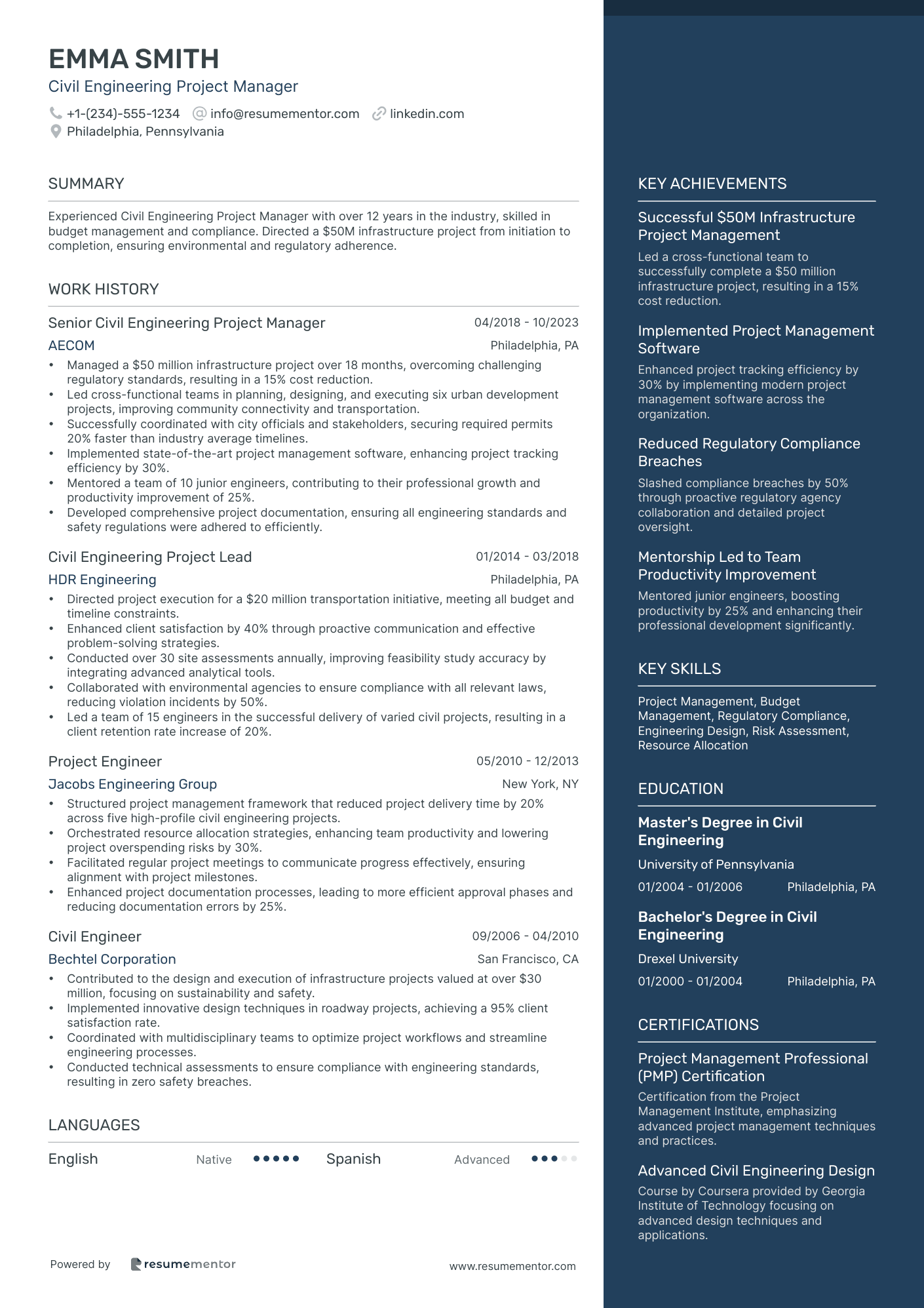
Civil Engineering Project Manager
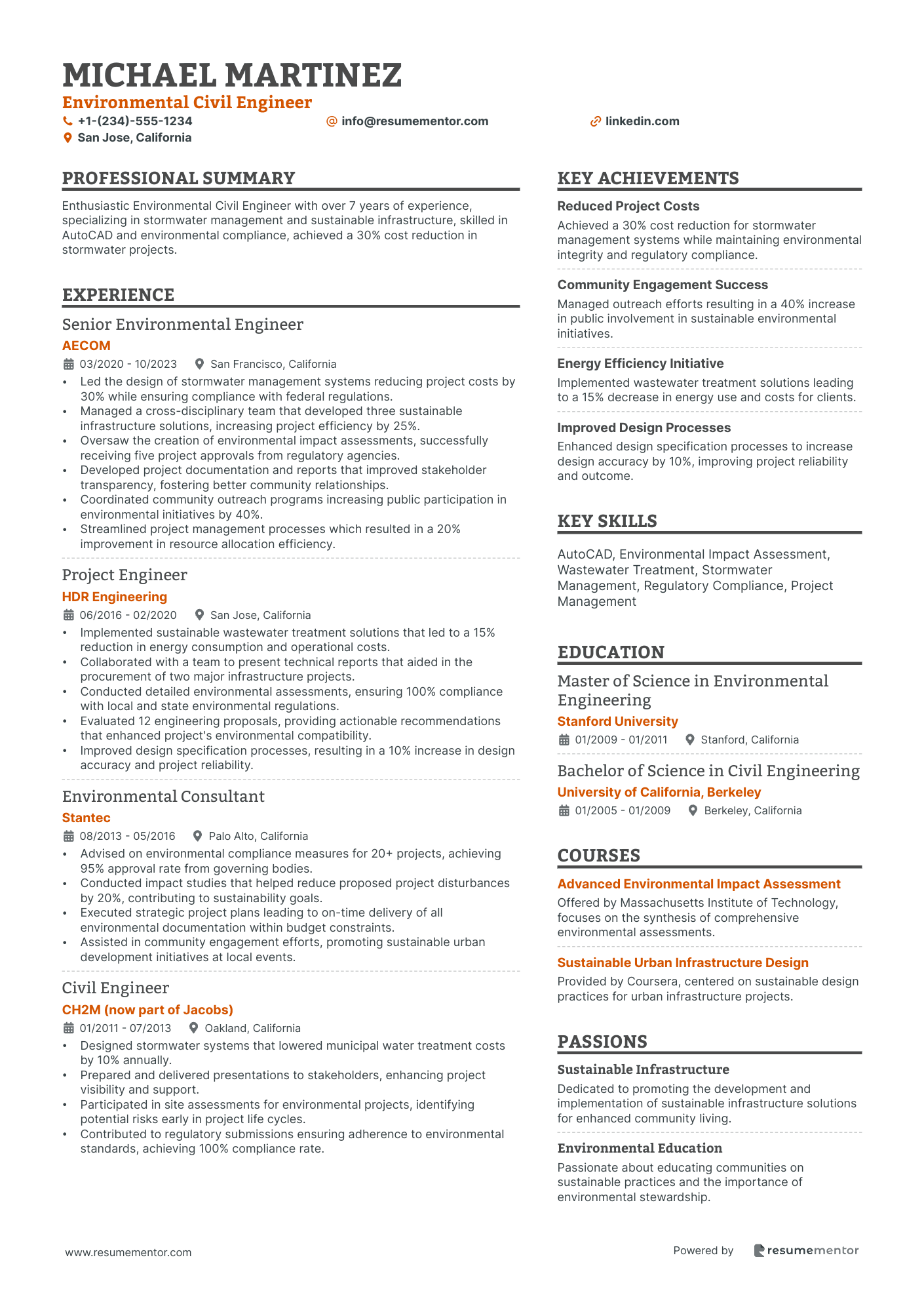
Environmental Civil Engineer
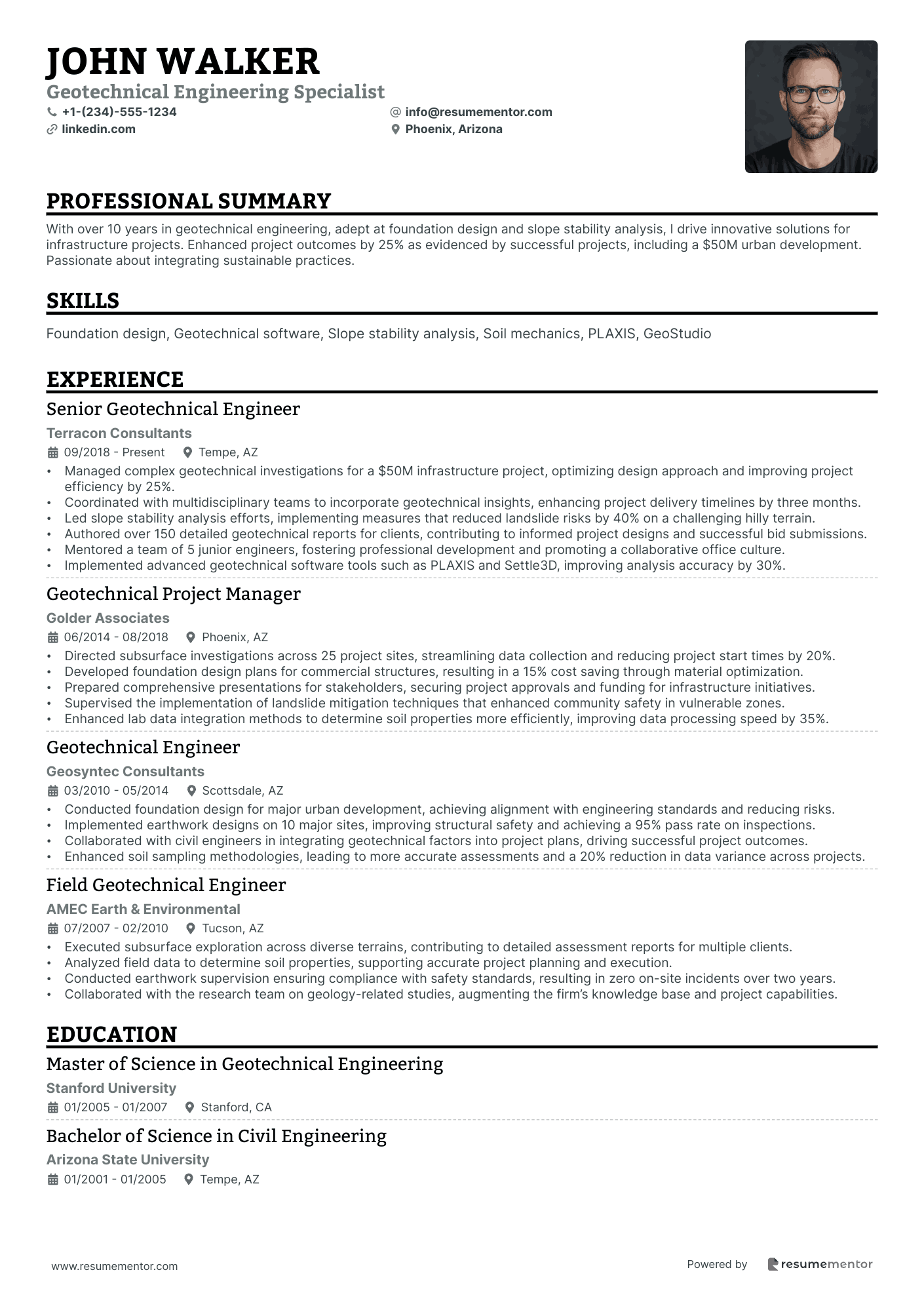
Geotechnical Engineering Specialist
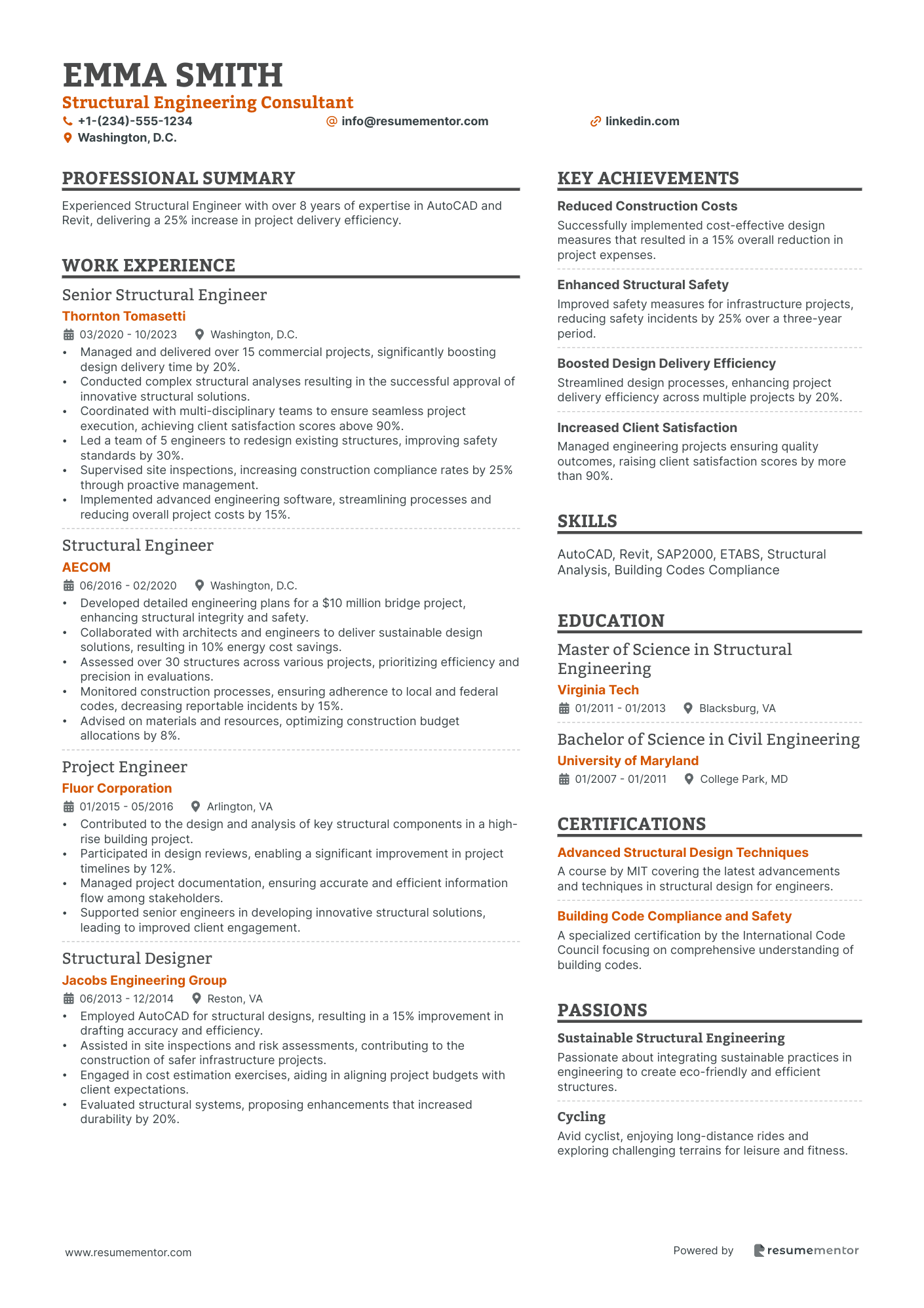
Structural Engineering Consultant
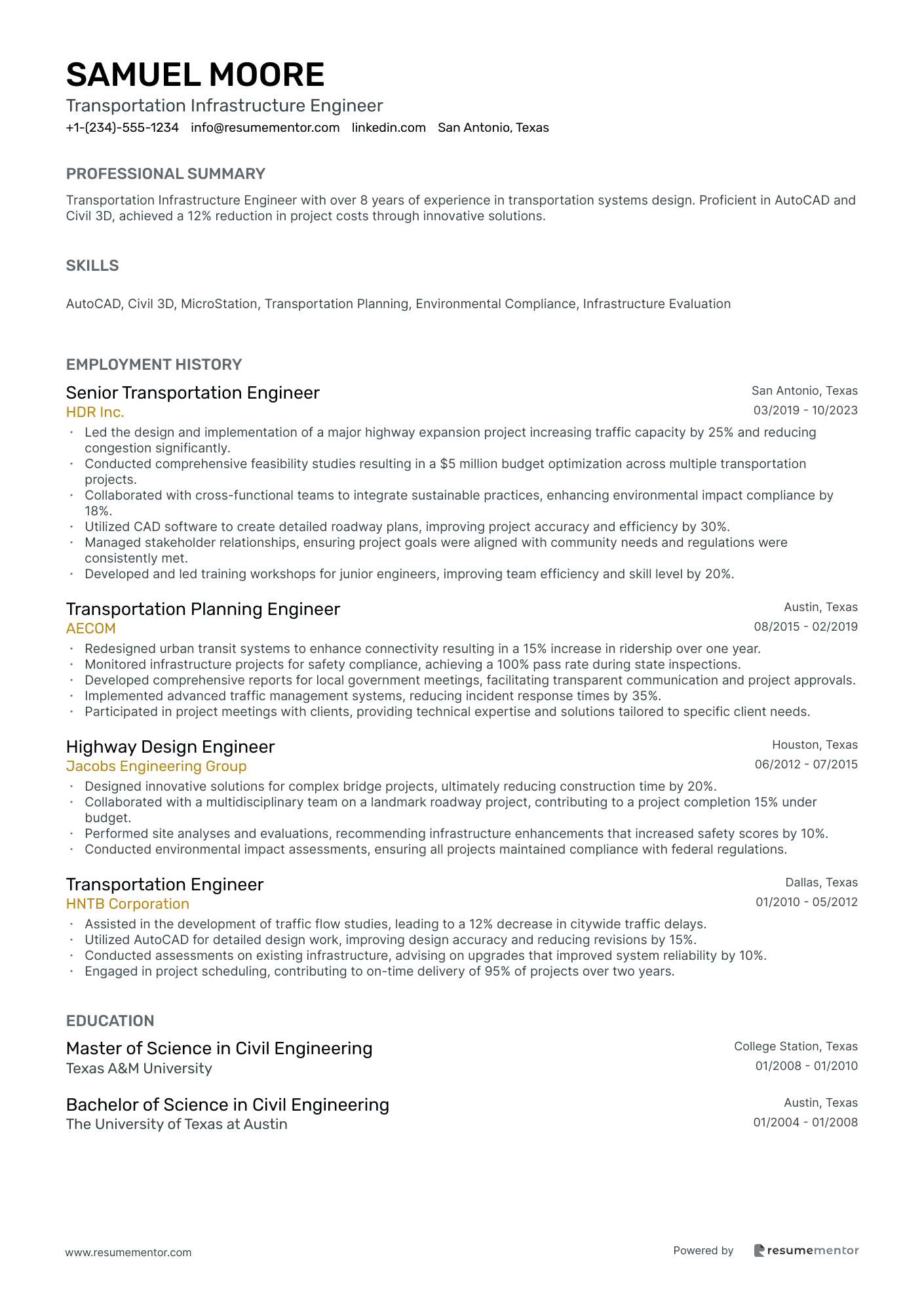
Transportation Infrastructure Engineer
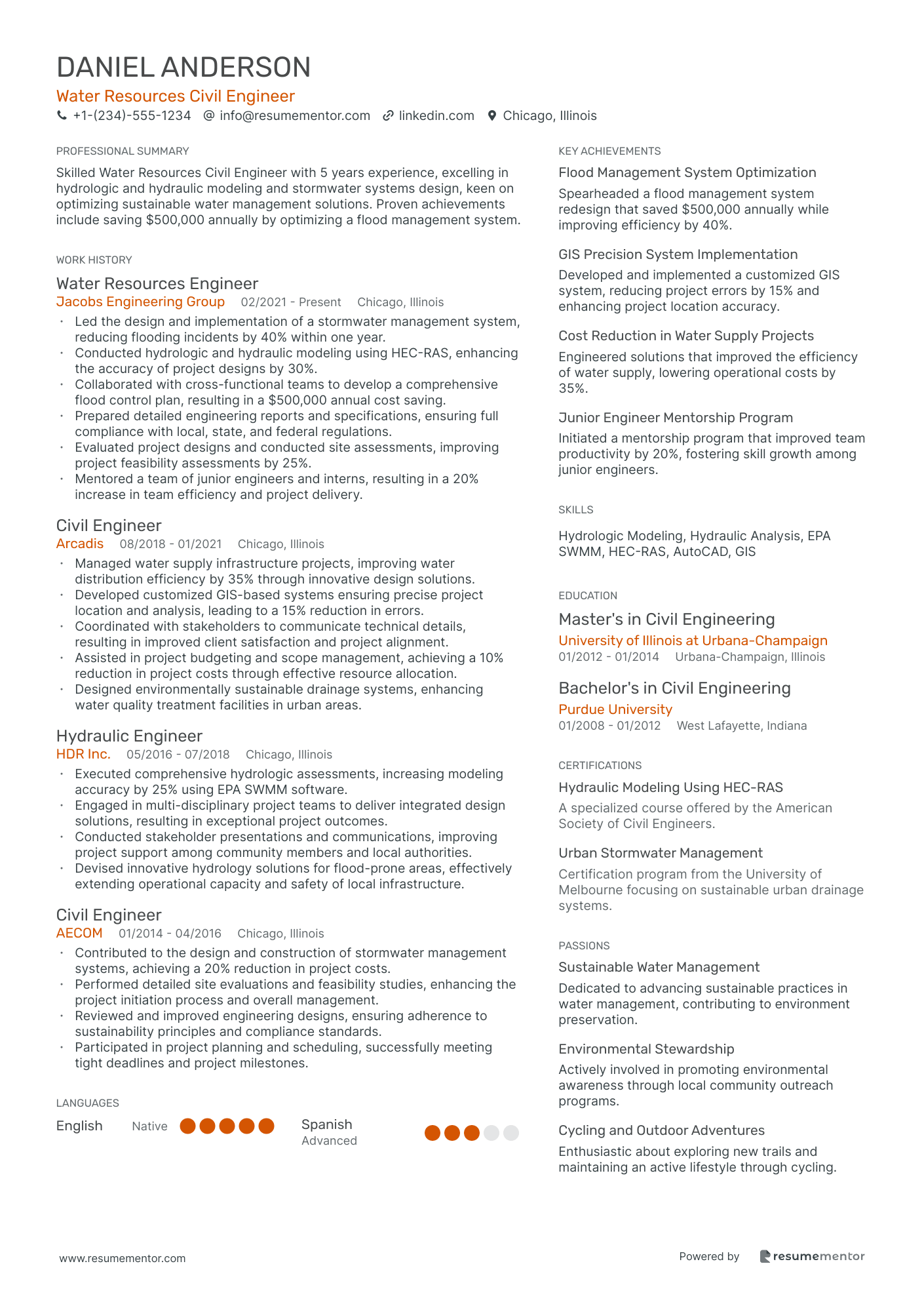
Water Resources Civil Engineer

Bridge Design Engineer
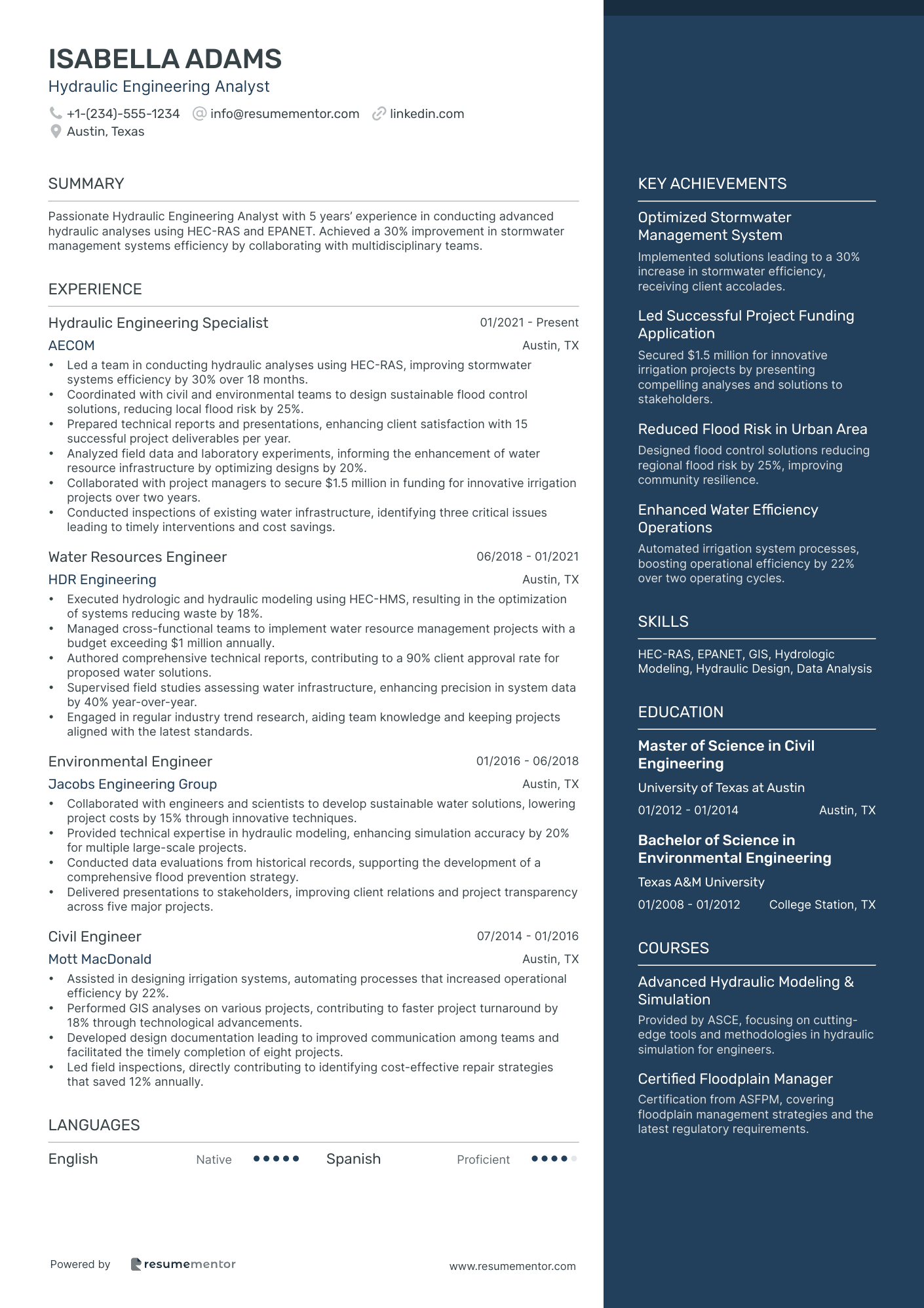
Hydraulic Engineering Analyst
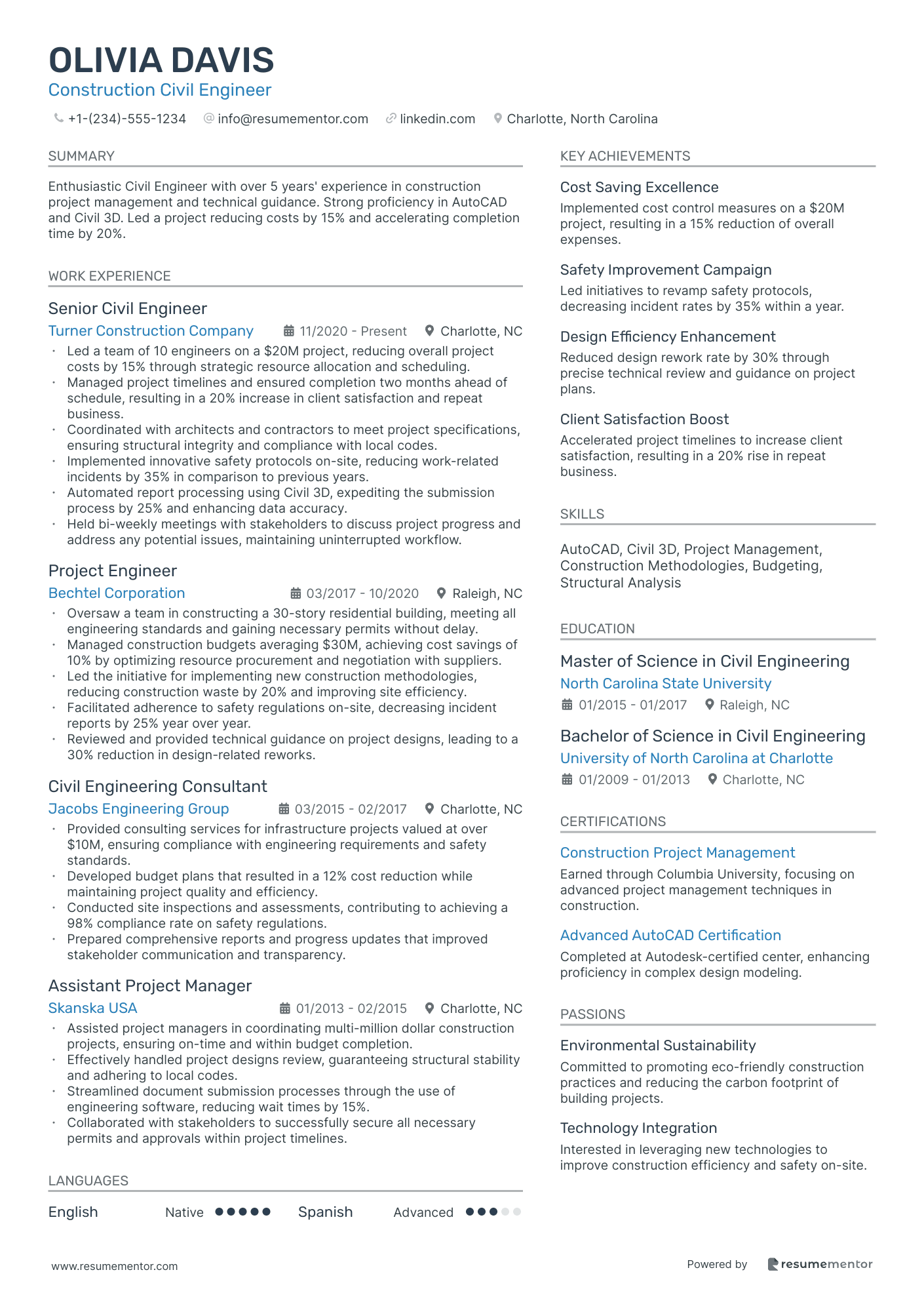
Construction Civil Engineer
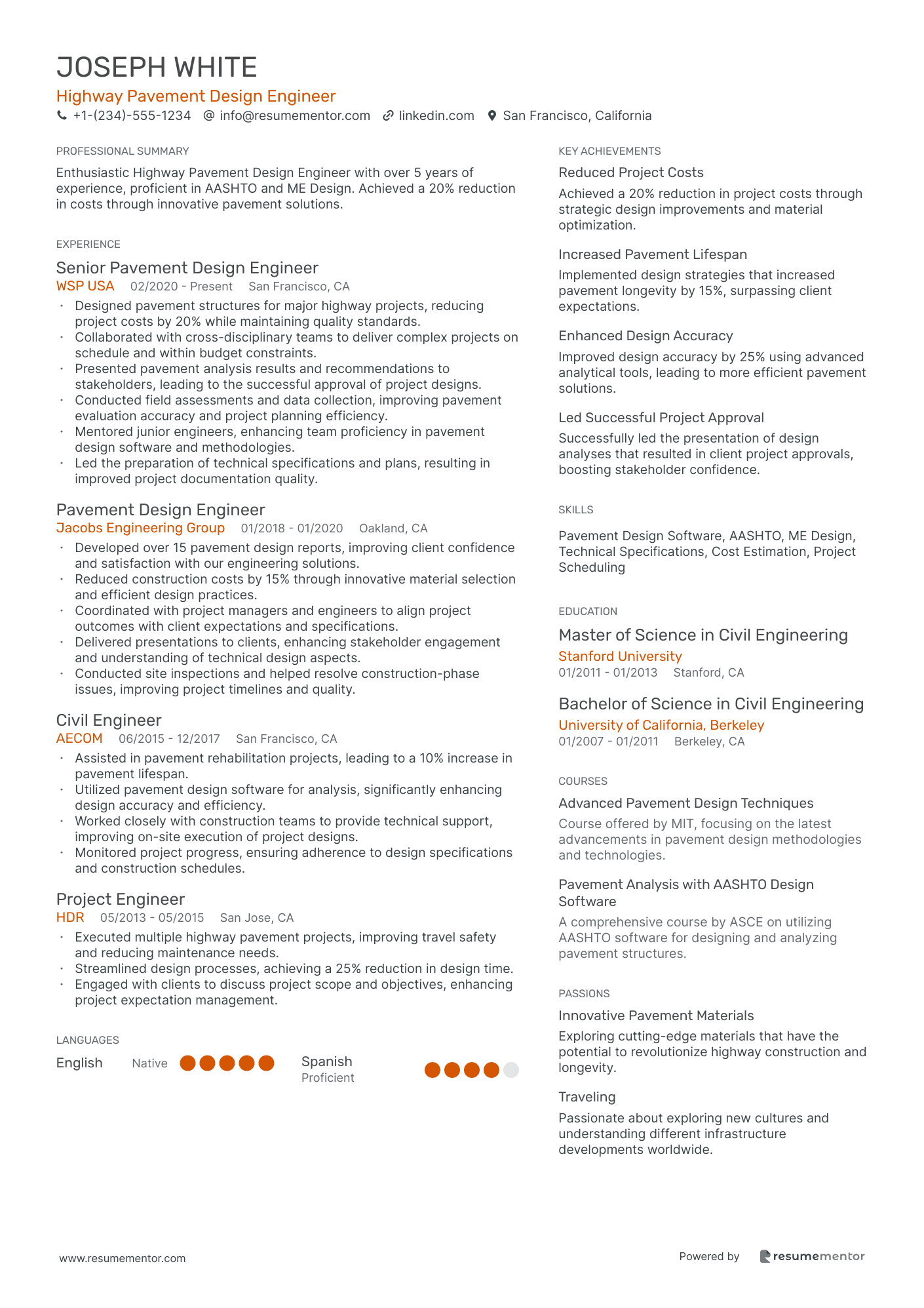
Highway Pavement Design Engineer

Civil Engineering Project Manager resume sample
- •Managed a $50 million infrastructure project over 18 months, overcoming challenging regulatory standards, resulting in a 15% cost reduction.
- •Led cross-functional teams in planning, designing, and executing six urban development projects, improving community connectivity and transportation.
- •Successfully coordinated with city officials and stakeholders, securing required permits 20% faster than industry average timelines.
- •Implemented state-of-the-art project management software, enhancing project tracking efficiency by 30%.
- •Mentored a team of 10 junior engineers, contributing to their professional growth and productivity improvement of 25%.
- •Developed comprehensive project documentation, ensuring all engineering standards and safety regulations were adhered to efficiently.
- •Directed project execution for a $20 million transportation initiative, meeting all budget and timeline constraints.
- •Enhanced client satisfaction by 40% through proactive communication and effective problem-solving strategies.
- •Conducted over 30 site assessments annually, improving feasibility study accuracy by integrating advanced analytical tools.
- •Collaborated with environmental agencies to ensure compliance with all relevant laws, reducing violation incidents by 50%.
- •Led a team of 15 engineers in the successful delivery of varied civil projects, resulting in a client retention rate increase of 20%.
- •Structured project management framework that reduced project delivery time by 20% across five high-profile civil engineering projects.
- •Orchestrated resource allocation strategies, enhancing team productivity and lowering project overspending risks by 30%.
- •Facilitated regular project meetings to communicate progress effectively, ensuring alignment with project milestones.
- •Enhanced project documentation processes, leading to more efficient approval phases and reducing documentation errors by 25%.
- •Contributed to the design and execution of infrastructure projects valued at over $30 million, focusing on sustainability and safety.
- •Implemented innovative design techniques in roadway projects, achieving a 95% client satisfaction rate.
- •Coordinated with multidisciplinary teams to optimize project workflows and streamline engineering processes.
- •Conducted technical assessments to ensure compliance with engineering standards, resulting in zero safety breaches.
Environmental Civil Engineer resume sample
- •Led the design of stormwater management systems reducing project costs by 30% while ensuring compliance with federal regulations.
- •Managed a cross-disciplinary team that developed three sustainable infrastructure solutions, increasing project efficiency by 25%.
- •Oversaw the creation of environmental impact assessments, successfully receiving five project approvals from regulatory agencies.
- •Developed project documentation and reports that improved stakeholder transparency, fostering better community relationships.
- •Coordinated community outreach programs increasing public participation in environmental initiatives by 40%.
- •Streamlined project management processes which resulted in a 20% improvement in resource allocation efficiency.
- •Implemented sustainable wastewater treatment solutions that led to a 15% reduction in energy consumption and operational costs.
- •Collaborated with a team to present technical reports that aided in the procurement of two major infrastructure projects.
- •Conducted detailed environmental assessments, ensuring 100% compliance with local and state environmental regulations.
- •Evaluated 12 engineering proposals, providing actionable recommendations that enhanced project's environmental compatibility.
- •Improved design specification processes, resulting in a 10% increase in design accuracy and project reliability.
- •Advised on environmental compliance measures for 20+ projects, achieving 95% approval rate from governing bodies.
- •Conducted impact studies that helped reduce proposed project disturbances by 20%, contributing to sustainability goals.
- •Executed strategic project plans leading to on-time delivery of all environmental documentation within budget constraints.
- •Assisted in community engagement efforts, promoting sustainable urban development initiatives at local events.
- •Designed stormwater systems that lowered municipal water treatment costs by 10% annually.
- •Prepared and delivered presentations to stakeholders, enhancing project visibility and support.
- •Participated in site assessments for environmental projects, identifying potential risks early in project life cycles.
- •Contributed to regulatory submissions ensuring adherence to environmental standards, achieving 100% compliance rate.
Geotechnical Engineering Specialist resume sample
- •Managed complex geotechnical investigations for a $50M infrastructure project, optimizing design approach and improving project efficiency by 25%.
- •Coordinated with multidisciplinary teams to incorporate geotechnical insights, enhancing project delivery timelines by three months.
- •Led slope stability analysis efforts, implementing measures that reduced landslide risks by 40% on a challenging hilly terrain.
- •Authored over 150 detailed geotechnical reports for clients, contributing to informed project designs and successful bid submissions.
- •Mentored a team of 5 junior engineers, fostering professional development and promoting a collaborative office culture.
- •Implemented advanced geotechnical software tools such as PLAXIS and Settle3D, improving analysis accuracy by 30%.
- •Directed subsurface investigations across 25 project sites, streamlining data collection and reducing project start times by 20%.
- •Developed foundation design plans for commercial structures, resulting in a 15% cost saving through material optimization.
- •Prepared comprehensive presentations for stakeholders, securing project approvals and funding for infrastructure initiatives.
- •Supervised the implementation of landslide mitigation techniques that enhanced community safety in vulnerable zones.
- •Enhanced lab data integration methods to determine soil properties more efficiently, improving data processing speed by 35%.
- •Conducted foundation design for major urban development, achieving alignment with engineering standards and reducing risks.
- •Implemented earthwork designs on 10 major sites, improving structural safety and achieving a 95% pass rate on inspections.
- •Collaborated with civil engineers in integrating geotechnical factors into project plans, driving successful project outcomes.
- •Enhanced soil sampling methodologies, leading to more accurate assessments and a 20% reduction in data variance across projects.
- •Executed subsurface exploration across diverse terrains, contributing to detailed assessment reports for multiple clients.
- •Analyzed field data to determine soil properties, supporting accurate project planning and execution.
- •Conducted earthwork supervision ensuring compliance with safety standards, resulting in zero on-site incidents over two years.
- •Collaborated with the research team on geology-related studies, augmenting the firm’s knowledge base and project capabilities.
Structural Engineering Consultant resume sample
- •Managed and delivered over 15 commercial projects, significantly boosting design delivery time by 20%.
- •Conducted complex structural analyses resulting in the successful approval of innovative structural solutions.
- •Coordinated with multi-disciplinary teams to ensure seamless project execution, achieving client satisfaction scores above 90%.
- •Led a team of 5 engineers to redesign existing structures, improving safety standards by 30%.
- •Supervised site inspections, increasing construction compliance rates by 25% through proactive management.
- •Implemented advanced engineering software, streamlining processes and reducing overall project costs by 15%.
- •Developed detailed engineering plans for a $10 million bridge project, enhancing structural integrity and safety.
- •Collaborated with architects and engineers to deliver sustainable design solutions, resulting in 10% energy cost savings.
- •Assessed over 30 structures across various projects, prioritizing efficiency and precision in evaluations.
- •Monitored construction processes, ensuring adherence to local and federal codes, decreasing reportable incidents by 15%.
- •Advised on materials and resources, optimizing construction budget allocations by 8%.
- •Contributed to the design and analysis of key structural components in a high-rise building project.
- •Participated in design reviews, enabling a significant improvement in project timelines by 12%.
- •Managed project documentation, ensuring accurate and efficient information flow among stakeholders.
- •Supported senior engineers in developing innovative structural solutions, leading to improved client engagement.
- •Employed AutoCAD for structural designs, resulting in a 15% improvement in drafting accuracy and efficiency.
- •Assisted in site inspections and risk assessments, contributing to the construction of safer infrastructure projects.
- •Engaged in cost estimation exercises, aiding in aligning project budgets with client expectations.
- •Evaluated structural systems, proposing enhancements that increased durability by 20%.
Transportation Infrastructure Engineer resume sample
- •Led the design and implementation of a major highway expansion project increasing traffic capacity by 25% and reducing congestion significantly.
- •Conducted comprehensive feasibility studies resulting in a $5 million budget optimization across multiple transportation projects.
- •Collaborated with cross-functional teams to integrate sustainable practices, enhancing environmental impact compliance by 18%.
- •Utilized CAD software to create detailed roadway plans, improving project accuracy and efficiency by 30%.
- •Managed stakeholder relationships, ensuring project goals were aligned with community needs and regulations were consistently met.
- •Developed and led training workshops for junior engineers, improving team efficiency and skill level by 20%.
- •Redesigned urban transit systems to enhance connectivity resulting in a 15% increase in ridership over one year.
- •Monitored infrastructure projects for safety compliance, achieving a 100% pass rate during state inspections.
- •Developed comprehensive reports for local government meetings, facilitating transparent communication and project approvals.
- •Implemented advanced traffic management systems, reducing incident response times by 35%.
- •Participated in project meetings with clients, providing technical expertise and solutions tailored to specific client needs.
- •Designed innovative solutions for complex bridge projects, ultimately reducing construction time by 20%.
- •Collaborated with a multidisciplinary team on a landmark roadway project, contributing to a project completion 15% under budget.
- •Performed site analyses and evaluations, recommending infrastructure enhancements that increased safety scores by 10%.
- •Conducted environmental impact assessments, ensuring all projects maintained compliance with federal regulations.
- •Assisted in the development of traffic flow studies, leading to a 12% decrease in citywide traffic delays.
- •Utilized AutoCAD for detailed design work, improving design accuracy and reducing revisions by 15%.
- •Conducted assessments on existing infrastructure, advising on upgrades that improved system reliability by 10%.
- •Engaged in project scheduling, contributing to on-time delivery of 95% of projects over two years.
Water Resources Civil Engineer resume sample
- •Led the design and implementation of a stormwater management system, reducing flooding incidents by 40% within one year.
- •Conducted hydrologic and hydraulic modeling using HEC-RAS, enhancing the accuracy of project designs by 30%.
- •Collaborated with cross-functional teams to develop a comprehensive flood control plan, resulting in a $500,000 annual cost saving.
- •Prepared detailed engineering reports and specifications, ensuring full compliance with local, state, and federal regulations.
- •Evaluated project designs and conducted site assessments, improving project feasibility assessments by 25%.
- •Mentored a team of junior engineers and interns, resulting in a 20% increase in team efficiency and project delivery.
- •Managed water supply infrastructure projects, improving water distribution efficiency by 35% through innovative design solutions.
- •Developed customized GIS-based systems ensuring precise project location and analysis, leading to a 15% reduction in errors.
- •Coordinated with stakeholders to communicate technical details, resulting in improved client satisfaction and project alignment.
- •Assisted in project budgeting and scope management, achieving a 10% reduction in project costs through effective resource allocation.
- •Designed environmentally sustainable drainage systems, enhancing water quality treatment facilities in urban areas.
- •Executed comprehensive hydrologic assessments, increasing modeling accuracy by 25% using EPA SWMM software.
- •Engaged in multi-disciplinary project teams to deliver integrated design solutions, resulting in exceptional project outcomes.
- •Conducted stakeholder presentations and communications, improving project support among community members and local authorities.
- •Devised innovative hydrology solutions for flood-prone areas, effectively extending operational capacity and safety of local infrastructure.
- •Contributed to the design and construction of stormwater management systems, achieving a 20% reduction in project costs.
- •Performed detailed site evaluations and feasibility studies, enhancing the project initiation process and overall management.
- •Reviewed and improved engineering designs, ensuring adherence to sustainability principles and compliance standards.
- •Participated in project planning and scheduling, successfully meeting tight deadlines and project milestones.
Bridge Design Engineer resume sample
- •Led the structural analysis and design of a 200-meter cable-stayed bridge using SAP2000, resulting in a 15% reduction in material costs.
- •Collaborated with geotechnical and transportation teams to ensure compliance with local and federal design standards, enhancing project efficiency.
- •Developed detailed design reports and documentation that improved client communication and facilitated project approvals.
- •Conducted site investigations which informed key design decisions, optimizing construction efficiency by 20%.
- •Mentored junior engineers, providing technical guidance that increased team productivity by 10%.
- •Executed complex structural designs for two major highway overpasses, enhancing traffic flow and safety standards significantly.
- •Coordinated cross-discipline teams and integrated environmental considerations, resulting in more sustainable bridge designs.
- •Prepared project proposals and presentations that secured contracts worth over $5 million.
- •Implemented state-of-the-art design software, increasing design accuracy and efficiency by 25%.
- •Ensured compliance with AASHTO LRFD and local DOT standards, achieving 100% regulatory approval on time.
- •Assisted in the design of a unique truss bridge, focusing on structural integrity and load distribution to enhance overall safety.
- •Conducted multiple site assessments that contributed to early identification of potential engineering challenges.
- •Streamlined design calculations and documentation processes, reducing project turnaround time by 18%.
- •Engaged in client consultations to align project objectives with engineering standards effectively.
- •Developed design concepts for over 20 bridge projects, ensuring economic and efficient use of materials.
- •Collaborated with stakeholders to facilitate smooth project execution, resulting in early delivery of key projects.
- •Enhanced bridge aesthetic designs, elevating public appeal and client satisfaction scores.
- •Implemented new structural analysis tools which improved design precision by 12%.
Hydraulic Engineering Analyst resume sample
- •Led a team in conducting hydraulic analyses using HEC-RAS, improving stormwater systems efficiency by 30% over 18 months.
- •Coordinated with civil and environmental teams to design sustainable flood control solutions, reducing local flood risk by 25%.
- •Prepared technical reports and presentations, enhancing client satisfaction with 15 successful project deliverables per year.
- •Analyzed field data and laboratory experiments, informing the enhancement of water resource infrastructure by optimizing designs by 20%.
- •Collaborated with project managers to secure $1.5 million in funding for innovative irrigation projects over two years.
- •Conducted inspections of existing water infrastructure, identifying three critical issues leading to timely interventions and cost savings.
- •Executed hydrologic and hydraulic modeling using HEC-HMS, resulting in the optimization of systems reducing waste by 18%.
- •Managed cross-functional teams to implement water resource management projects with a budget exceeding $1 million annually.
- •Authored comprehensive technical reports, contributing to a 90% client approval rate for proposed water solutions.
- •Supervised field studies assessing water infrastructure, enhancing precision in system data by 40% year-over-year.
- •Engaged in regular industry trend research, aiding team knowledge and keeping projects aligned with the latest standards.
- •Collaborated with engineers and scientists to develop sustainable water solutions, lowering project costs by 15% through innovative techniques.
- •Provided technical expertise in hydraulic modeling, enhancing simulation accuracy by 20% for multiple large-scale projects.
- •Conducted data evaluations from historical records, supporting the development of a comprehensive flood prevention strategy.
- •Delivered presentations to stakeholders, improving client relations and project transparency across five major projects.
- •Assisted in designing irrigation systems, automating processes that increased operational efficiency by 22%.
- •Performed GIS analyses on various projects, contributing to faster project turnaround by 18% through technological advancements.
- •Developed design documentation leading to improved communication among teams and facilitated the timely completion of eight projects.
- •Led field inspections, directly contributing to identifying cost-effective repair strategies that saved 12% annually.
Construction Civil Engineer resume sample
- •Led a team of 10 engineers on a $20M project, reducing overall project costs by 15% through strategic resource allocation and scheduling.
- •Managed project timelines and ensured completion two months ahead of schedule, resulting in a 20% increase in client satisfaction and repeat business.
- •Coordinated with architects and contractors to meet project specifications, ensuring structural integrity and compliance with local codes.
- •Implemented innovative safety protocols on-site, reducing work-related incidents by 35% in comparison to previous years.
- •Automated report processing using Civil 3D, expediting the submission process by 25% and enhancing data accuracy.
- •Held bi-weekly meetings with stakeholders to discuss project progress and address any potential issues, maintaining uninterrupted workflow.
- •Oversaw a team in constructing a 30-story residential building, meeting all engineering standards and gaining necessary permits without delay.
- •Managed construction budgets averaging $30M, achieving cost savings of 10% by optimizing resource procurement and negotiation with suppliers.
- •Led the initiative for implementing new construction methodologies, reducing construction waste by 20% and improving site efficiency.
- •Facilitated adherence to safety regulations on-site, decreasing incident reports by 25% year over year.
- •Reviewed and provided technical guidance on project designs, leading to a 30% reduction in design-related reworks.
- •Provided consulting services for infrastructure projects valued at over $10M, ensuring compliance with engineering requirements and safety standards.
- •Developed budget plans that resulted in a 12% cost reduction while maintaining project quality and efficiency.
- •Conducted site inspections and assessments, contributing to achieving a 98% compliance rate on safety regulations.
- •Prepared comprehensive reports and progress updates that improved stakeholder communication and transparency.
- •Assisted project managers in coordinating multi-million dollar construction projects, ensuring on-time and within budget completion.
- •Effectively handled project designs review, guaranteeing structural stability and adhering to local codes.
- •Streamlined document submission processes through the use of engineering software, reducing wait times by 15%.
- •Collaborated with stakeholders to successfully secure all necessary permits and approvals within project timelines.
Highway Pavement Design Engineer resume sample
- •Designed pavement structures for major highway projects, reducing project costs by 20% while maintaining quality standards.
- •Collaborated with cross-disciplinary teams to deliver complex projects on schedule and within budget constraints.
- •Presented pavement analysis results and recommendations to stakeholders, leading to the successful approval of project designs.
- •Conducted field assessments and data collection, improving pavement evaluation accuracy and project planning efficiency.
- •Mentored junior engineers, enhancing team proficiency in pavement design software and methodologies.
- •Led the preparation of technical specifications and plans, resulting in improved project documentation quality.
- •Developed over 15 pavement design reports, improving client confidence and satisfaction with our engineering solutions.
- •Reduced construction costs by 15% through innovative material selection and efficient design practices.
- •Coordinated with project managers and engineers to align project outcomes with client expectations and specifications.
- •Delivered presentations to clients, enhancing stakeholder engagement and understanding of technical design aspects.
- •Conducted site inspections and helped resolve construction-phase issues, improving project timelines and quality.
- •Assisted in pavement rehabilitation projects, leading to a 10% increase in pavement lifespan.
- •Utilized pavement design software for analysis, significantly enhancing design accuracy and efficiency.
- •Worked closely with construction teams to provide technical support, improving on-site execution of project designs.
- •Monitored project progress, ensuring adherence to design specifications and construction schedules.
- •Executed multiple highway pavement projects, improving travel safety and reducing maintenance needs.
- •Streamlined design processes, achieving a 25% reduction in design time.
- •Engaged with clients to discuss project scope and objectives, enhancing project expectation management.
As a civil engineer, creating a resume can feel like building a bridge—connecting your skills and experience to your dream job. However, translating your technical expertise into compelling language can be challenging, making your resume crucial for first impressions with potential employers.
Dealing with complex projects and technical skills can make condensing everything into clear, impactful language seem daunting. That's where using a resume template comes in handy. It provides a structured foundation, letting you focus on your core strengths—engineering solutions. Check out these resume templates to craft a resume that effectively showcases your skills.
Tailoring your resume to fit the civil engineering field is like customizing a blueprint for a specific project. This approach ensures your experience aligns with what employers are looking for. A clear, organized format helps prevent your achievements from getting lost, which is essential in standing out.
Capturing the reader’s attention quickly with your relevant skills can make all the difference. Highlighting your strengths, like project management and structural design, keeps your contributions front and center. Your resume should speak the language of the civil engineering field to make an impact.
Ultimately, your resume is a strategic tool that paves the way to your next opportunity. When structured well and focused on your technical skills, it can transform your application into a standout in the civil engineering landscape.
Key Takeaways
- Using a structured resume template can help civil engineers translate technical expertise into clear and impactful language, focusing on core strengths like engineering solutions.
- Highlighting relevant skills such as project management and structural design is crucial to make a strong impression in the civil engineering field.
- Employers value resumes that are tailored to the industry, emphasizing job-relevant experience and a clear, organized format to prevent achievements from being overlooked.
- Choosing the right format, such as chronological, and saving the resume as a PDF, ensures clarity and consistency across devices, maintaining a professional appearance.
- Quantifying achievements in the work experience section helps potential employers see the tangible impact and value you bring to their company, enhancing your chances of standing out.
What to focus on when writing your civil engineering resume
A civil engineering resume should convey your expertise in design and construction management while highlighting your problem-solving skills. This shows your ability to bring complex projects to life within budget and on time.
How to structure your civil engineering resume
- Contact Information: Start with your full name, phone number, email address, and LinkedIn profile—these details make it seamless for employers to reach you and learn more about your professional presence.
- Professional Summary: In a concise paragraph, emphasize your years of experience and areas of specialization while introducing key achievements in civil engineering—this overview sets the tone for your resume by aligning your expertise with the employer’s needs.
- Work Experience: List your previous jobs in reverse chronological order, focusing on civil engineering roles. Detail specific projects and your contributions to demonstrate your practical experience—highlight tasks like infrastructure design or project management to showcase your ability to navigate complex challenges.
- Education: Include your degrees and the institutions you attended, with graduation dates for context. Highlight relevant coursework or honors to illustrate your depth of knowledge in civil engineering—this academic background supports your technical qualifications.
- Skills: Focus on civil engineering skills, such as structural analysis, CAD software, and understanding building codes and regulations—these competencies reinforce your technical proficiency and readiness to tackle engineering tasks.
- Certifications and Licenses: Add relevant certifications, like a PE (Professional Engineer) license or LEED certification, to underscore your professional readiness—these credentials validate your expertise and credibility in the field.
Consider adding sections like "Projects" to delve into standout engineering projects or "Professional Affiliations" for memberships in groups like ASCE (American Society of Civil Engineers). These extras can further illustrate your dedication to the field. Below, we'll cover each section more in-depth to ensure your resume format effectively showcases your qualifications.
Which resume format to choose
In civil engineering, crafting the perfect resume begins with choosing the right format to effectively showcase your career path. A chronological format suits this field best, as it emphasizes your work history and allows potential employers to easily track your progression and achievements over time. This format caters to industry expectations and highlights your growing expertise and reliability in civil engineering projects.
Enhancing the presentation of your resume, fonts like Lato, Montserrat, or Raleway add a modern touch. While the choice of font may seem minor, these styles help create a clean, professional look, aligning with the precision and attention to detail valued in civil engineering. They stand out from more traditional fonts, subtly conveying innovation and a forward-thinking approach.
Consistency in presentation is vital, which is why saving your resume as a PDF is crucial. This file type preserves your layout and design, ensuring that your resume looks the same across different platforms and devices. Such consistency is essential for maintaining a professional appearance when your resume is shared with various companies and reviewed by different hiring managers.
Maintaining professionalism also involves setting your margins to one inch on all sides. This choice keeps your resume neat and structured, allowing for easy readability and a logical flow of information. Well-defined margins contribute to a balanced presentation, ensuring your accomplishments and skills are the focus without overwhelming busy hiring managers.
By carefully considering these elements, you can craft a resume that not only aligns with industry standards but also positions you as a standout candidate in the civil engineering field.
How to write a quantifiable resume experience section
The civil engineering resume experience section is your opportunity to showcase the tangible impact you've made using quantifiable achievements. This part of your resume helps potential employers understand the real results you've delivered in past roles, making a strong impression. Start by listing your most recent job and go back about 10-15 years, making sure to highlight job titles that are relevant to the role you're applying for. It's crucial to tailor your resume to match the job ad. Look for keywords and phrases within the ad and use them in your descriptions. Action words such as "designed," "implemented," "managed," and "optimized" help communicate your contributions clearly and effectively.
- •Designed and managed the construction of a $20M wastewater facility, cutting processing time by 30%.
- •Implemented stormwater systems that cut runoff by 25%, boosting urban sustainability.
- •Worked with diverse teams to finish projects 15% under budget while meeting all regulations.
- •Streamlined materials buying, slashing costs by 10% and speeding project timelines by 8%.
This experience section seamlessly connects your achievements to specific results, showing the clear impact of your work. Each bullet point highlights outcomes that are not only tangible but also strategically significant, painting you as a results-driven professional. By using action words, you directly link your efforts to the successes achieved, making your role in these accomplishments unmistakable. Tailoring your descriptions to mirror the language in job ads further ensures you address the specific needs of potential employers, positioning you as the ideal candidate for the job.
Responsibility-Focused resume experience section
A responsibility-focused civil engineering resume experience section should highlight your ability to manage and execute projects successfully while showcasing your leadership skills. Begin by identifying the most important responsibilities you held in each role, using clear and straightforward language. It's helpful to focus on action verbs that demonstrate leadership and proactivity. To make your experience impactful, emphasize achievements and results rather than just listing tasks, and whenever possible, include specific numbers or outcomes to illustrate the impact of your work.
Describe the projects you managed, their scale, and your contributions to their success to provide a clear picture of your capabilities. Discuss how you worked with teams, maintained the budget, and solved critical problems, ensuring each bullet point reflects your individual impact. By doing so, you help potential employers see the value you can bring to their organization, enabling them to envision your contributions and leadership in their team.
Lead Structural Engineer
City Infrastructure Inc.
June 2020 - Present
- Led a team of 10 engineers in designing a new urban bridge, completing the project 15% under budget.
- Developed and implemented a safety protocol that reduced workplace accidents by 20%.
- Coordinated with contractors and government agencies to ensure compliance with local regulations.
- Managed the project timeline using Gantt charts, improving delivery efficiency by 25%.
Skills-Focused resume experience section
A skills-focused civil engineering resume experience section should bring your practical abilities and accomplishments to the forefront. Highlight the specific skills that fit the job you're aiming for and share a concise overview of the projects or roles where you put these skills to work. The goal is to spotlight your problem-solving talents, technical expertise, and contributions to successful projects. Aligning your experience with the job description ensures you emphasize the skills most valued by potential employers.
To make your achievements stand out, use active language and quantify them whenever possible. Start by listing your employment dates, job title, and workplace name. Each bullet point should begin with action verbs to effectively describe tasks or outcomes like boosting project efficiency, slashing costs, or leading a team. This not only helps hiring managers envision your contributions but also underscores the potential impact you could bring to their team.
Senior Structural Engineer
ABC Civil Engineering Solutions
June 2018 - Present
- Led a team of 5 engineers in designing sustainable bridge structures, trimming project costs by 15%.
- Created innovative solutions to tackle complex structural challenges, speeding up project completion by 20%.
- Worked with multidisciplinary teams to ensure projects hit deadlines while staying within budget.
- Boosted safety protocols, which improved worker safety and decreased site incidents by 30%.
Growth-Focused resume experience section
A growth-focused civil engineering resume experience section should highlight your achievements and contributions in a cohesive manner that demonstrates your professional development. Start by illustrating how you've applied your problem-solving skills, shown leadership, and achieved project goals within your roles. Use action verbs to clearly convey your experiences, and include quantifiable outcomes to demonstrate the impact you’ve made. This approach not only highlights your technical skills but also reflects your capacity for growth.
Aligning your resume with the job you're applying for is crucial. Select examples that show how you contributed to the growth of projects or teams, focusing on skills that match what the employer seeks. Include context, like project size or budgets, to provide a clearer picture of your role and accomplishments. This helps potential employers easily understand the scope of your experience and the value you can bring to their team.
Project Engineer
ABC Construction Co.
June 2020 - Present
- Led a team of 10 in the successful completion of a bridge project 2 months ahead of schedule.
- Revised construction plans which increased efficiency by 15% and reduced budget overruns by 10%.
- Implemented software tools that enhanced project tracking and improved overall team communication.
- Facilitated weekly meetings to align team goals, elevating project success rates.
Collaboration-Focused resume experience section
A collaboration-focused civil engineer resume experience section should effectively highlight how teamwork and communication led to project success. Begin by listing your job title and workplace, followed by the dates you held each position. Use bullet points to showcase your role in team initiatives, the skills employed, and the positive results gained. Incorporating action verbs like "coordinated," "partnered," and "collaborated" emphasizes your cooperative nature. Ensure your accomplishments are measurable and underscore their relevance to teamwork, which will attract employers seeking collaborative engineers.
Focus on experiences that demonstrate your ability to work with teams to achieve common goals, such as designing, planning, or executing projects. Highlight how cross-departmental cooperation, effective communication with subcontractors, or leadership roles contributed to project success. Mentioning specific projects and their results illustrates your capacity as a team player. Use data points and numbers to clearly depict how collaborative efforts led to successful outcomes, making your resume stand out.
Civil Engineer
GreenBuild Solutions
June 2019 - April 2023
- Coordinated with a team of 20 engineers developing a sustainable drainage system, cutting flood risks by 50%.
- Facilitated weekly meetings with subcontractors and stakeholders to ensure clear communication and projects stayed on track.
- Worked with environmental scientists on green construction practices, leading to a 30% drop in CO2 emissions.
- Teamed up with local government to secure project approvals, enabling timely completion of a highway expansion.
Write your civil engineering resume summary section
A civil engineering-focused resume summary should quickly capture the reader's attention and provide a clear picture of your strengths. This section is your chance to highlight your skills, experience, and unique qualities that make you an excellent candidate. Use straightforward language to emphasize your capabilities that align with the job. For a civil engineer, it's crucial to showcase skills like project management, technical knowledge, and past successes. Here's an example to consider:
This summary is effective because it connects your specific skills and experiences vital to civil engineering roles. It demonstrates your ability to manage projects, lead teams, and solve complex problems—traits that employers prioritize. Focusing on your strengths and tailoring them to the job you're targeting can make a strong impression.
Understanding the differences between a resume summary and an objective is essential to crafting your resume. A summary underscores your work experience and competencies, while an objective relays your career aspirations and how they align with the company’s goals. Similarly, a resume profile or a summary of qualifications can merge your skills, achievements, and objectives into a concise presentation. For those with more experience, a summary can effectively display your career highlights. In contrast, an objective can express your ambitions if you're new to the field. Tailoring your summary or objective to fit the job description ensures it resonates well with potential employers.
Listing your civil engineering skills on your resume
A civil engineering-focused resume should effectively highlight your skills and competencies. One way to achieve this is by showcasing your strengths and relevant abilities in the skills section. This section can stand alone or be woven into other parts of your resume, like the experience or summary sections. For instance, mentioning how you've applied specific skills in past projects can enhance your experience narrative. Your strengths and soft skills, such as leadership and communication, demonstrate adaptability and a collaborative nature, making you a valuable team player. On the flip side, hard skills are the technical abilities you've honed through education and experience, such as proficiency in AutoCAD or expertise in structural analysis.
Skills and strengths also serve as powerful resume keywords, helping your resume stand out to hiring managers and digital screening tools. Using relevant keywords improves the chances that your resume will capture the attention of potential employers.
Consider this example of a standalone skills section in JSON format:
This example is effective because it lists skills specific to civil engineering, offering a clear snapshot of your technical expertise. Each listed skill aligns with industry demands, underscoring your suitability for the role.
Best hard skills to feature on your civil engineering resume
Hard skills are essential for civil engineers as they display technical competence and the ability to perform specific tasks. These competencies illustrate your mastery in engineering principles, design software, and project management. Here are 15 key hard skills to highlight:
Hard Skills
- Structural Analysis
- AutoCAD
- Civil 3D
- Hydraulic Modeling
- Geotechnical Engineering
- Construction Management
- Site Development
- Transportation Engineering
- Revit
- Environmental Engineering
- Surveying
- Primavera P6
- Cost Estimation
- BIM (Building Information Modeling)
- Material Science
Best soft skills to feature on your civil engineering resume
Soft skills are crucial as they showcase your ability to collaborate effectively and handle the dynamic challenges of engineering projects. These qualities reflect your leadership, communication, and problem-solving abilities. Consider these 15 soft skills:
Soft Skills
- Communication
- Leadership
- Teamwork
- Problem-solving
- Time Management
- Adaptability
- Creativity
- Attention to Detail
- Interpersonal Skills
- Decision-making
- Conflict Resolution
- Critical Thinking
- Resilience
- Negotiation
- Emotional Intelligence
How to include your education on your resume
The education section is a vital part of your civil engineering resume. It shows your academic background and accomplishments, and must be tailored to the job you're applying for. Only include relevant education, leaving out unnecessary details that don't apply to the role. When listing your degree, be clear and specific about the type and field of study. If you have a notable GPA, typically 3.5 or higher, consider including it on your resume alongside the maximum GPA, like 4.0. Distinctions such as cum laude should be added to showcase your academic achievements and dedication. Here is a wrong and right example of a civil engineering resume education section.
The second example is strong because it focuses on the relevant field and includes a solid GPA with an honor distinction, demonstrating both competence and achievement in civil engineering. It directly relates to the job, showing the potential employer that you have the essential educational background and dedication needed for the role. Furthermore, unnecessary and unrelated information is avoided, keeping the resume focused and effective. It makes you stand out by linking education with job skills. Keeping it precise and relevant is key to crafting an impactful civil engineering resume.
How to include civil engineering certificates on your resume
In a civil engineering resume, the certificates section is an important part because it shows your professional development and industry-specific skills. List the name of each certificate clearly. Include the date you obtained each certificate, as this shows your recent achievements. Add the issuing organization to establish credibility and authenticity. Certificates can also be included in the resume header for quick visibility. For example, you could write "Certified Engineer – Project Management Institute" right after your name at the top.
Here's an example of a well-crafted certificates section.
This example includes widely recognized and relevant certificates for civil engineering. "Project Management Professional" is useful for overseeing complex projects. "Professional Engineer" is essential for legality and industry standards. Each certificate is accompanied by the issuing organization, enhancing its legitimacy. Ensuring these details provides a professional presentation for hiring managers.
Extra sections to include on your civil engineering resume
Crafting a civil engineering resume involves showcasing your skills, experience, and attributes to potential employers, making it stand out in a competitive field. Highlighting key sections like languages, hobbies, volunteer work, and books can reveal valuable insights about your personality and capabilities beyond technical prowess.
- Language section — List any additional languages you speak fluently, such as Spanish or Mandarin, to show communication versatility. Highlighting language skills can indicate your ability to work in diverse environments and communicate effectively with varied teams or clients.
- Hobbies and interests section — Mention hobbies that align with civil engineering, like model building or hiking, to showcase your creative or analytical skills. This helps employers see a well-rounded profile and can serve as conversation starters during interviews.
- Volunteer work section — Detail any engineering-related volunteer projects, such as Habitat for Humanity builds, to demonstrate civic responsibility and passion for your field. Volunteer work can illustrate teamwork skills and dedication to using your expertise for societal benefit.
- Books section — Share books you’ve read related to civil engineering, such as "The Design of Everyday Things," to show ongoing learning. Including books can display your interest in expanding your knowledge and staying updated with industry trends.
Each resume section should be crafted meticulously to present a holistic view of your abilities, making sure it resonates well with potential employers who value both technical skills and personal qualities.
In Conclusion
In conclusion, creating a standout civil engineering resume is much like engineering a successful project—it requires precision, attention to detail, and a strategic approach. Your resume is more than just a list of jobs; it is a bridge connecting you with your next opportunity. By focusing on your unique skills and experiences, you can present yourself as an accomplished professional ready to tackle complex challenges. Using a structured format ensures your achievements are highlighted, making them easily accessible to hiring managers. Tailoring your resume to civil engineering ensures your qualifications align with what employers are looking for. An effective resume not only showcases your technical skills but also demonstrates your ability to communicate effectively and work within a team. Including relevant certifications adds credibility to your profile, reinforcing your readiness for the demands of the field. By clearly presenting your education, skills, and achievements, you set yourself apart from other candidates. Extras such as volunteer work or language skills can further illustrate your dedication and adaptability. Ultimately, a well-crafted civil engineering resume serves as your marketing tool, demonstrating to employers that you are the right fit for their needs.
Related Articles

Continue Reading
Check more recommended readings to get the job of your dreams.
Resume
Resources
Tools
© 2026. All rights reserved.
Made with love by people who care.

